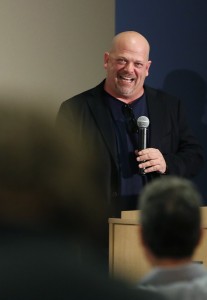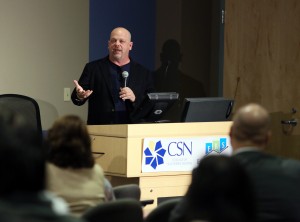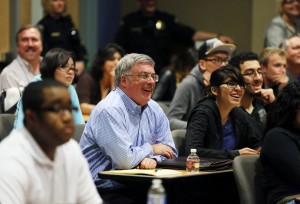What’s the key to making it big? 
Ask Rick Harrison, who managed to disrupt the politics behind the pawn shop industry in Las Vegas, make a few bucks, and then disrupt the reality television industry with his hit cable show, “Pawn Stars.”
He told a group of College of Southern Nevada business students Tuesday that the key to success is this: “Don’t be a blanking whiner.”
He laughed, of course, but he was also serious. Work hard and go around the obstacles. They’re always going to be there.
Harrison, co-owner of the World Famous Gold & Silver Pawn Shop on Las Vegas Boulevard, spoke to the group of about 100 students for the kick-off of CSN’s Elite Business Series. The new monthly series is sponsored through a partnership between the college and Arista Wealth Management President & Managing Member Paul Moffat. Moffat is a local advocate of higher education who saw an opportunity to create a series of lectures that provide Southern Nevada’s future business leaders with local role models.
He couldn’t have done better than Harrison, who is the definition of a self-made businessman. “I didn’t get here overnight,” he said.
He told the students how, as a child, he developed epilepsy, which included violent seizures. His life changed dramatically, and soon he found himself reading books all the time. He learned to love reading.
“I have been addicted to books since I was 8 years old,” he said.
His family moved to Las Vegas when he was a teenager, and, after a rough patch that included dropping out of high school because of his epilepsy, he decided he wanted to get into the pawn shop business. His father already owned a small coin shop, so it seemed like a great idea.
But the old-boy network in Las Vegas, he said, wouldn’t allow it. He plunged forward anyway, and eventually overcame the politics and got his pawn shop license.
“So now I have a pawn shop and I’m broke,” he said of that time in the late 1980s, “and I’m competing against giant corporations.”
He kept going, anyway, because he knew he could. He pledged to work harder than the other people in the business. He’d do what needed to be done, even if it meant working 80- and 90-hour weeks for years.
It worked, so he sought out his next challenge: Reality TV. He pitched his idea everywhere. Cameras would follow him and his family members at their pawn shop as they appraised items, both valuable and junk. It was sure to be a hit, he told the television executives.
“No one wants to see a show about four fat guys in a pawn shop,” they told him.
A pilot of sorts was shot, but didn’t air.
He kept going, anyway.
Another pseudo-pilot was shot. He learned to milk the system, using one executive’s desire to bring out others.
“In the television business, no one wants you unless someone else wants you,” he said.
Soon, he scored. The History Channel ate it up.
Now, he’s got one of the highest-rated shows on cable TV. He employs dozens of people. And he makes plenty of money.
He said he believes he would have done it faster if he’d been able to stay in school and go on to get a business degree. But either way, the secret to his success isn’t so secret, he said: “All it takes is a lot of hard work.”

